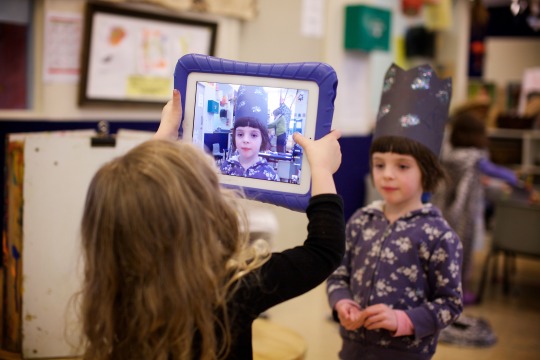Sharon Carlson of CORE Education is an experienced teacher and specialist in the area of cybersafety and digital learning. This blog post written by Sharon draws on her years of experience and the latest practices in ECE.

Internet capable devices have become part of our life, assisting us with so many of our daily tasks. Children are born into this world and know no different, they see and engage with these devices with an ease and simplicity that I am often in amazed by. Skyping family and friends, using apps to play and learn, recording video, taking photos, selfies – recording their lives and creating a wonderful life-long journal and rich artefact.
Many positives come from the use of ICT but there are also areas that as parents we need to be aware of. If you don’t understand the challenges it is more difficult to minimise the risks. I have provided 10 tips that I hope you find useful. I would also like you to share your thoughts, ideas and tips so we can build a useful resource to support others.
TIPS:
- As a team or family set guidelines together with children as part of them being trusted to use the device appropriately. You may still feel the need to continue to check what your child is doing, viewing and engaging with on the ICT device.
- Research recommends that screen time for children requires monitoring. For older children encourage them to monitor their own habits, for young children parents need to check this. There is a difference between watching TV (being an inactive consumer of information) than using ICT where they can be an active investigator, communicator and creator. If you want to know more about screen time here is a useful reading Moving beyond screen time
- For very young children use apps that don’t require the internet and deactivate the internet connection/flight mode

- Use the app yourself to check that it doesn’t have inappropriate content, ads, or encourage in app purchases. There are a lot of rubbish apps out there, be selective. What benefits does this app offer my child? Delete the rubbish apps from your device.
- Adults should role model social ‘netiquette’, decide as a family what is ok and what is not – i.e not using the device during meal time, when socialising, while driving, etc
- What digital footprint are you and your child creating? I recommend watching this short video of a child’s lifetime digital footprint. If children have social media accounts i.e. facebook, snapchat, check they are of legal age to have these accounts for instance Facebook is R 13. You can measure your digital footprint here.
- If children have social media accounts ensure family members are among their online friends/contacts – if you can’t say it to your grandmother you shouldn’t be saying it online. It’s like writing with pen instead of pencil, nearly impossible to permanently remove.
- Control a child’s footprint and support them in creating their own stories using photos and video or adding voice comments on Storypark using the Storypark app. Only those who have been invited to join your child’s community will have access to these, reducing their digital footprint.
- Be aware of the information apps are obtaining from you and what they have access to, for instance does the Google maps app require access to your contacts?
- Use a strong password – think of your password as a Toothbrush.
- choose a strong one that is at least 8 characters with a mix of letters, numbers and symbols, lower and uppercase and shouldn’t be a common word or phrase.
- NEVER share it.
- Change it regularly.
- You can test how strong your password is here.

Other useful sites:
https://www.commonsensemedia.org/screen-time
Preschoolers addicted to tablets – is it a bad thing?
https://www.youtube.com/watch?v=79IYZVYIVLA&list=PL0qnQ0DQd5ep7Ja0UZhD6QkGUY-jWlILK
http://digitalfootprintimu.weebly.com/measure-your-footprint.html


Share this: